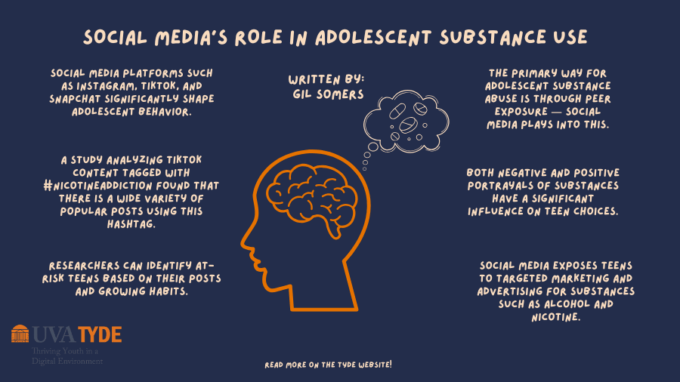TYDE launched its monthly training series on September 12, 2024, with UVA Psychology professor Stefanie Sequeira who led the group in a state-of-the-field review on research about youth mental health and digital technology. Twenty-five people from across Grounds attended, including professors, doctors and clinicians from the medical school, graduate students, and interested members of the community.
Youth Mental Health and Smartphones
Social media use is ubiquitous among adolescents–a reality that some argue is to blame for rising rates of youth mental illness. Sequeria cited statistics that 95% of US teens have access to smartphones, 50-60% use apps like Snapchat, TikTok, and Instagram daily, and 50% of youth reported using the internet “almost constantly.” But what does it mean to use the internet “almost constantly”? Does it mean that teens are locked in a nonstop doom scroll that is deteriorating their self-esteem and social skills? Or are they using the internet to communicate with friends, do homework, make plans, share jokes, or read the news? The internet is pervasive across all aspects of modern life, so frequent use does not necessarily indicated problematic behavior.
The world of technology and mental health also merge in the booming industry of mental health apps. Sequeria said there are tens of thousands of apps available, many marketed directly to teens, that claim to provide mental health support. The popularity of these products may indicate a growing interest in mental health treatment and limited access to professional mental health professionals. Few of the mental health care apps available implement evidence-based approaches to treatment, however. Clinicians and researchers might play a role in helping to develop age-appropriate mental health interventions that use technology to make evidence-based treatments more widely available. At the same time, they should also be advocating for system-level changes that might make professional mental health care more accessible.
Research on Teen’s Social Media and Internet Use
For researchers interested in studying how youth mental health and digital technology, there are a few key methodologies, including:
- Questionnaires and ecological momentary assessment (EMA)
- These self report surveys ask youth to estimate how much time they spend on their phone, what they’ve been doing, how they feel
- Passive sensing
- The phone or apps can log information that tracks social media or phone usage patterns
- Social media data donations
- Young people can be recruited to donate their social media data to researchers
- Qualitative approaches
- Semi-structured interviews and focus group
Each of these methods raise different questions and specific strengths and limitations. Ethical and privacy concerns should always be paramount, Sequeria advised.
As policy makers, clinicans, educators, and parents consider how and when to regulate social media, Sequeria urged the audience to remember that different youth have different needs and use digital technology in different ways and that a one-size-fits-all approach was probably not going to work.



